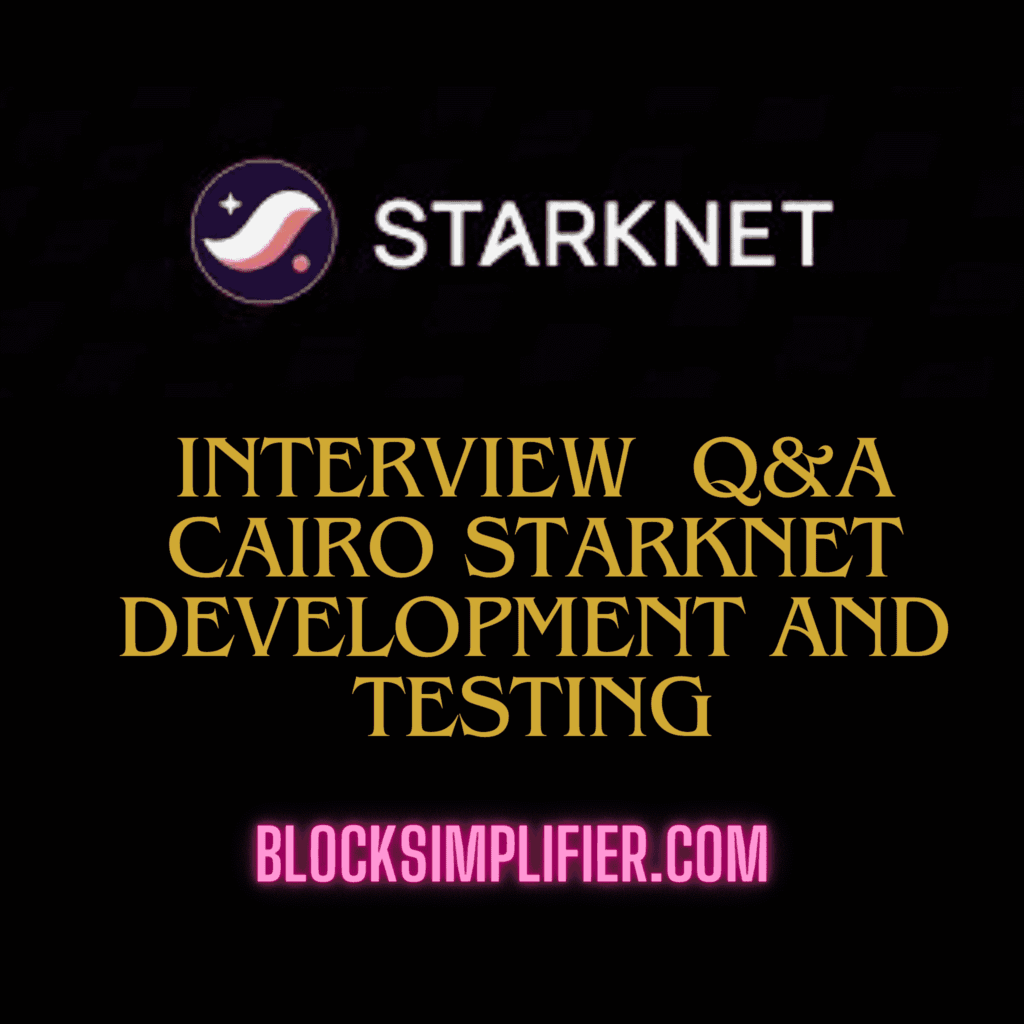Below is a list of frequently asked Interview Questions and their answers about Cairo StarkNet Development and Testing Cairo StarkNet smart contracts Using Foundry from beginner to advance.
Table of Contents
Cairo StarkNet Development
General Questions
Q1. What is Cairo in the context of StarkNet?
A: Cairo is a Turing-entire programming language specifically designed for writing provable applications, on the whole used for StarkNet. It permits builders to write efficient, scalable, and steady decentralized packages (dApps) the usage of Zero-Knowledge Proofs (ZKPs).
Q2. What is StarkNet?
A: StarkNet is a decentralized, permissionless Layer 2 scaling solution for Ethereum built using ZK-STARK generation. It enables scalability with the aid of offloading computation and storage from the Ethereum mainnet.
Q3. How does Cairo differ from Solidity?
A: Cairo is designed for Zero-Knowledge Proofs and is optimized for producing STARK proofs.
- Solidity is the number one language for Ethereum clever settlement improvement, focusing on execution on the Ethereum Virtual Machine (EVM).
- Cairo uses concepts like felt (field elements) and operates within its own virtual machine (the Cairo VM).
Q4. What are the key advantages of using StarkNet?
A:
- Scalability: StarkNet handles large-scale computations off-chain.
- Cost-Effectiveness: Lower gas fees compared to Ethereum mainnet.
- Security: Inherits the security of Ethereum using validity proofs.
Q5. How do you install Cairo?
A: You can install Cairo using pip (Python’s package manager):
pip install cairo-lang
Development Questions
Q6. How do I set up a development environment for StarkNet?
A:
- Install Cairo:
pip install cairo-lang - Install StarkNet CLI:
Usestarknetinstructions to engage with the StarkNet network. - Use a testnet or local devnet: Deploy and check your clever contracts in a check surroundings.
Q7. What is felt in Cairo?
A:felt (field element) is the primary data type in Cairo, representing a 252-bit integer. It’s used to store numbers within the StarkNet virtual machine efficiently.
Q8. How do I write a simple smart contract in Cairo?
A:
Here’s an example of a basic contract:
%lang starknet
@external
func set_value{syscall_ptr : felt*, pedersen_ptr : HashBuiltin*}(value : felt) -> ():
let (stored_value) = value
return ()
end
Q9. What tools can I use for debugging Cairo programs?
A:
- Cairo Playground: An online tool to run and test small Cairo programs.
- StarkNet Devnet: A local testing environment.
- VSCode Extensions: For syntax highlighting and debugging support.
Q10. What are Cairo modules?
A: Cairo modules are reusable code components that include utility libraries, standard functions, and mathematical tools to simplify development.
Deployment Questions
Q11. How do I deploy a contract on StarkNet?
A:
- Compile the contract:
cairo-compile contract.cairo --output contract.json - Deploy the contract:
starknet deploy --contract contract.json --network alpha
Q12. What is the StarkNet address format?
A:
StarkNet uses a unique 252-bit address format. These addresses are derived from the hash of the contract’s bytecode and inputs.
Q13. How do I interact with deployed contracts?
A:
Use the StarkNet CLI or SDKs to call contract methods:
starknet invoke --function <function_name> --address <contract_address> --inputs <inputs> --network <network>
Advanced Questions
Q14. What is the purpose of the Cairo VM?
A:
The Cairo Virtual Machine executes Cairo programs and generates cryptographic proofs (STARKs) to verify their correctness.
Q15. What are StarkNet Account Contracts?
A:
StarkNet adopts an account abstraction model where every user interacts through an account contract. This enables features like multi-signature wallets, custom authentication methods, and meta-transactions.
Q16. What is the StarkNet Sequencer?
A:
The StarkNet Sequencer batches transactions, generates STARK proofs for them, and submits the proofs to Ethereum for verification.
Q17. Can I use StarkNet for NFTs?
A:
Yes, StarkNet helps NFT requirements which includes ERC-721 and ERC-1155, permitting green creation and trading of NFTs with decreased charges.
Q18. What are Cairo’s native data structures?
A:
- Arrays: For storing sequences of
felt. - Tuples: Fixed-size collections.
- Dictionaries (Maps): Key-value pairs for efficient lookups.
Q19. How do I integrate Cairo with a frontend?
A:
You can use StarkNet.js, an official JavaScript library, to interact with Cairo contracts from frontend applications.
Q20. What are some common pitfalls in Cairo development?
A:
- Understanding field arithmetic: Operations in Cairo are modular over a prime field.
- Error handling: Cairo lacks traditional error handling; you must implement checks manually.
- Gas optimization: Cairo programs can consume gas quickly without efficient implementation.
Testing Cairo StarkNet smart contracts within Foundry
General Questions
Q1. What is Foundry in the context of StarkNet smart contract testing?
A:
Foundry is a high-performance development and testing framework originally designed for Solidity. With the StarkNet plugin, Foundry supports Cairo smart contracts, enabling efficient testing, debugging, and deployment of contracts for StarkNet.
Q2. Why should I use Foundry for testing Cairo contracts?
A:
- Speed: Foundry’s test execution is significantly faster than other frameworks.
- Integration: It allows easy integration with StarkNet for Cairo contract testing.
- Tooling: Includes fuzz testing, property-based testing, and debugging tools.
Q3. How do I install the Foundry framework?
A:
Run the following commands to install Foundry:
curl -L https://foundry.paradigm.xyz | bash
foundryup
Q4. What additional setup is required for Cairo StarkNet testing?
A:
You need the StarkNet Foundry plugin. Install it using the following:
forge install keep-starknet-strange --git https://github.com/keep-starknet-strange/forge-starknet
Writing and Running Tests
Q5. How do I write a test for a Cairo smart contract in Foundry?
A:
- Create a test contract: Write tests in Solidity or Cairo, depending on your preference.
- Use
setUpfunction: This initializes the state before each test. - Example:
contract StarkNetTest is DSTest { address public starknetContract; function setUp() public { starknetContract = deployCairoContract("path/to/contract.cairo"); } function testCallFunction() public { uint256 result = callStarkNetFunction(starknetContract, "get_value", [42]); assertEq(result, 42); } }Q6. How do I deploy a Cairo contract using Foundry?
A:
Use the deployCairoContract helper method:
address starknetContract = deployCairoContract("path/to/contract.cairo");
Q7. How do I call functions in Cairo contracts from Foundry tests?
A:
Use the callStarkNetFunction method:
uint256 result = callStarkNetFunction(
starknetContract,
"function_name",
[input_1, input_2]
);Q8. Does Foundry support fuzz testing for Cairo contracts?
A:
Yes, you can use Foundry’s fuzz testing capabilities to test Cairo contracts with random inputs. Fuzz testing helps uncover edge cases.
Debugging and Optimization
Q9. How do I debug a failed Cairo test in Foundry?
A:
- Run the test with verbosity enabled:
forge test -vvvv - Analyze the stack trace and logs.
- Insert debug statements in the Cairo code to identify issues.
Q10. Can I run gas estimation for Cairo contracts in Foundry?
A:
Currently, Foundry’s StarkNet plugin doesn’t provide direct gas estimation. However, you can monitor gas usage via StarkNet tools and logs.
Integration and Compatibility
Q11. Can I use Solidity and Cairo contracts in the same Foundry project?
A:
Yes, Foundry allows seamless integration of Solidity and Cairo contracts in a single project. Ensure both compilers (Solc and Cairo) are configured.
Q12. How do I integrate Foundry with StarkNet.js for frontend testing?
A:
After deploying your contracts via Foundry, you can interact with them using StarkNet.js by fetching the contract address and ABI.
Best Practices
Q13. What are the best practices for writing Cairo tests in Foundry?
A:
- Modular Tests: Write tests for individual functions to isolate issues.
- Assertions: Use
assertEqor similar methods to validate results. - Property Testing: Leverage Foundry’s property-based testing for complex logic.
Q14. How do I handle Cairo-specific data types like felt in Foundry tests?
A:felt values are represented as uint256 in Foundry. You can directly pass them as inputs or outputs in tests.
Advanced Features
Q15. Can I use cheat codes for Cairo contracts in Foundry?
A:
Yes, Foundry’s cheat codes (e.g., warp, roll) can be used to simulate time or blockchain state changes for StarkNet tests.
Q16. How do I test interactions between multiple Cairo contracts?
A:
Deploy multiple contracts and use callStarkNetFunction to simulate interactions between them:
address contractA = deployCairoContract("contractA.cairo");
address contractB = deployCairoContract("contractB.cairo");
// Call a function in contractA that interacts with contractB
callStarkNetFunction(contractA, "interact_with_contract_b", [contractB]);
Q17. Can I test Cairo upgradeable contracts in Foundry?
A:
Yes, you can simulate proxy contracts and their logic by deploying both the proxy and logic contracts, then testing their interaction.
Common Issues
Q18. My Cairo contract deployment fails in Foundry. What should I do?
A:
- Ensure Cairo is properly compiled using the latest tools.
- Verify the contract’s constructor inputs and format.
- Check compatibility of the StarkNet plugin.
Q19. Why are my tests slower compared to Solidity tests?
A:
Cairo proofs and StarkNet operations require additional computation, leading to slightly longer test times compared to Solidity.
Q20. How do I clean up test data after each run?
A:
Use the setUp function to reset the state or redeploy contracts for each test case.



